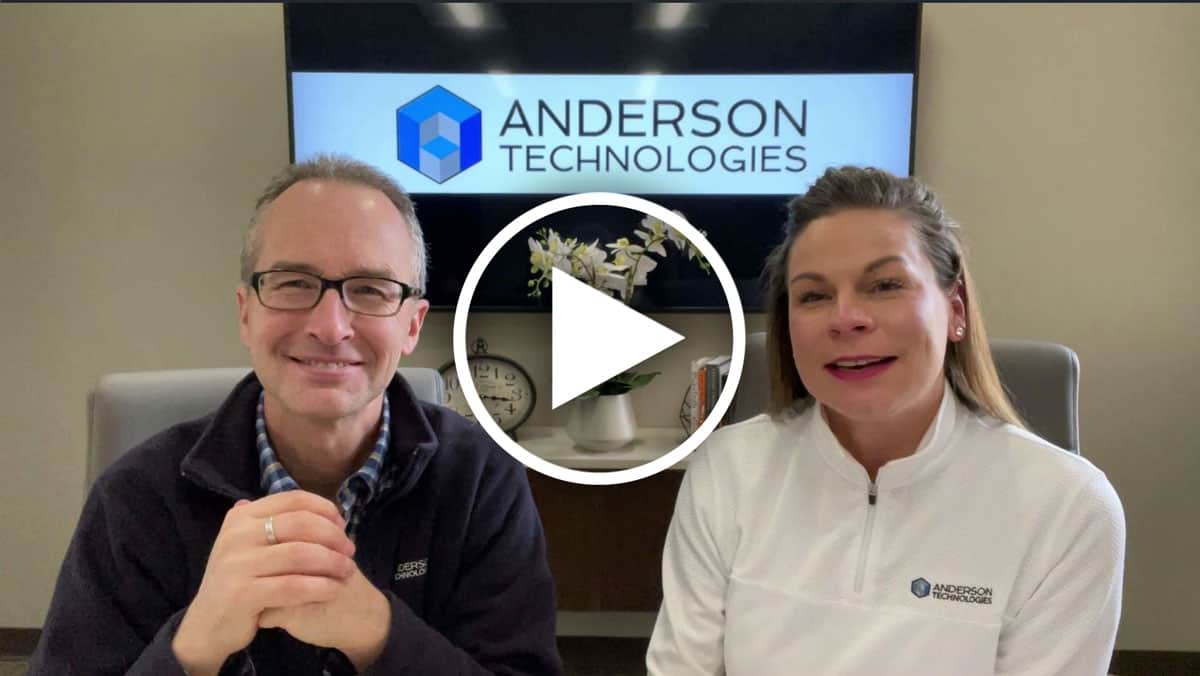Mark Anderson and Libby Powers discuss the importance of backups. Mark shares the story of a new client who’s server crashed on day three of our managed IT services agreement. Because Anderson Technologies had implemented backups on a Business Continuity Disaster Recovery Device, most employees at the client couldn’t even tell that the server had failed!
Related Reading
Transcript
Libby Powers: Hi, everybody, welcome to another episode of Byte-Size Tech. I’m here again with Mark Anderson, one of the founding principals of Anderson Technologies. Today we’re going to be talking about the importance of backups. It’s really important to have backups in place. Think of all of your employees and what they do over the course of the day, and losing all of that information just because you didn’t have a proper backup in place.
Mark Anderson: Or failure occurred, right.
Libby Powers: Yeah, we actually have a client that we work with now, it’s a law firm, and their server essentially kicked the bucket.
Mark Anderson: That’s right.
Libby Powers: So what happened to that law firm?
Mark Anderson: It was an interesting story, Libby, thank you. We had just done our IT infrastructure audit, which we do for all new potential customers, and had identified their primary server was well over five years old. We said, “This thing really needs to be addressed. Essentially, it’s on fire. It’s like a bonfire sitting over there.” And they agreed. We were within probably the third day of our new arrangement with them and, wouldn’t you know, the server failed.
Libby Powers: Oh, of course, I think that’s what karma is, or Murphy’s Law or something crazy like that.
Mark Anderson: Yes, exactly. The good news, though, was that we had the ability to fail the server over or virtualize the server on what is known as a business continuity disaster recovery device.
Libby Powers: Hold on. That’s a really big word for this.
Mark Anderson: This is the smallest model. But yes, that’s it.
Libby Powers: The law firm essentially had all of their data protected.
Mark Anderson: Right, that’s right. This thing that Libby was holding up allows us to do two things. We’re able to back up data onto itself locally, but it also then has a cloud subscription and it shunts all of the data to two separate geographically disparate data centers, one on the East Coast and then one in Utah. So that if there was an event, you know, tornado or whatever going on in one area, it wouldn’t be in the other, etc. So at any rate, we were able to use this device and fail the server over to it, which meant this took over the role that the server used to play.
Libby Powers: That’s pretty incredible, I’m not going to lie. Just thinking of all the data that’s available at a law firm, your client data. Gosh, I can’t imagine what attorneys have to deal with courts.
Mark Anderson: Me either.
Libby Powers: Over my head, once again, but it’s pretty incredible to understand that this little device here was the Hail Mary, right?
Mark Anderson: The fun thing was, after we had failed over the server and got everyone back up and running very, very quickly, we took one of the principals back to the server room. Normally when you open the door, very loud fan noise and all the rest of it, and it was almost deathly silent in there. And you could tell that they got a rather quizzical look on their face, because they knew, “Hmm, this is a little different.” I pointed out the lights on the server, which obviously were completely dark, and said…Well, let me let me back up. They felt like, “Wait a minute, what do you mean our server failed? It didn’t fail, we’re completely up.” And I said, “Come on back. Let’s go see for ourselves.” I pointed out that the server was indeed completely dark, and they were absolutely amazed and very grateful, honestly, that the investment in that technology paid off so handsomely for them, and they didn’t miss a beat.
Libby Powers: So one more quick question. How often should you be doing a backup?
Mark Anderson: That’s a great question, Libby. I hate saying that it depends, but depending on your particular business, the frequency of backup could vary. We would recommend for most normal businesses, doing an hourly backup is the recommended frequency because it allows you to roll back to just one hour before and get everything back. You know, nightly is kind of almost too long these days. Sometimes years and years ago, it was even less frequent than that.
Libby Powers: I can’t imagine losing even what I do, which isn’t that important compared to that.
Mark Anderson: That’s not true.
Libby Powers: Well, Mark, I really appreciate you joining me today and giving us a little bit of information regarding backups. If you have any questions, please reach out to a managed IT firm to learn more, or you can reach out to us. We’re always happy to help. Thanks.
Mark Anderson: Thanks, guys. Bye.




